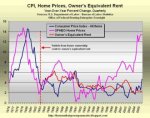- Joined
- Jul 19, 2012
- Messages
- 14,185
- Reaction score
- 8,768
- Location
- Houston
- Gender
- Male
- Political Leaning
- Libertarian
Obama Tells Tall Tales About Bush Years To Attack Romney - Investors.com
Romney, [Obama] says, wants to do two things: Cut taxes for the rich and massively deregulate the economy.
"The truth is," Obama says, "we tried (that) for almost a decade, and it didn't work."
Bush-era tax cuts and deregulation, he argues "resulted in the most sluggish job growth in decades" along with "rising inequality, surpluses turned into deficits, culminating in the worst economic crisis in our lifetimes."
There's just one problem. Obama's got his history wrong.
Bush did NOT do a lot of deregulation. The deregulation took place under Clinton. Having had to deal with Enron, Bush was busy throwing CEOs in jail and re-regulating, hiring more regulators, and putting more money in the regulatory effort.
Also, the Bush tax cuts DID work. Between when they went into effect in 2003 and 2007 when the economy was overtaken by the housing bubble there was a growth in jobs of 8.1 million. It is NOT true that the rich paid proportionally less tax under the Bush tax cuts. They paid MORE of the total tax burden.
Moreover, following the Reagan tax cuts and deregulation the nation enjoyed a tremendous period of growth lasting 8 years at double the current GDP growth rate.



![URL]](/proxy.php?image=http%3A%2F%2F%5BURL%5Dhttp%3A%2F%2Fwww.americanthinker.com%2Fblog%2FFed%2520Banking%2520Regs.gif%5B%2FURL%5D&hash=3d434da84c9389e491740c3dc554a098)